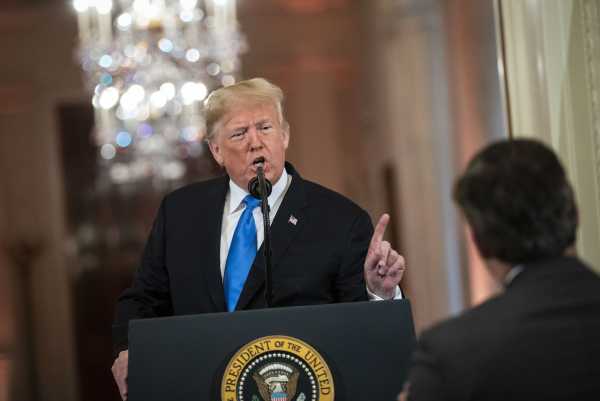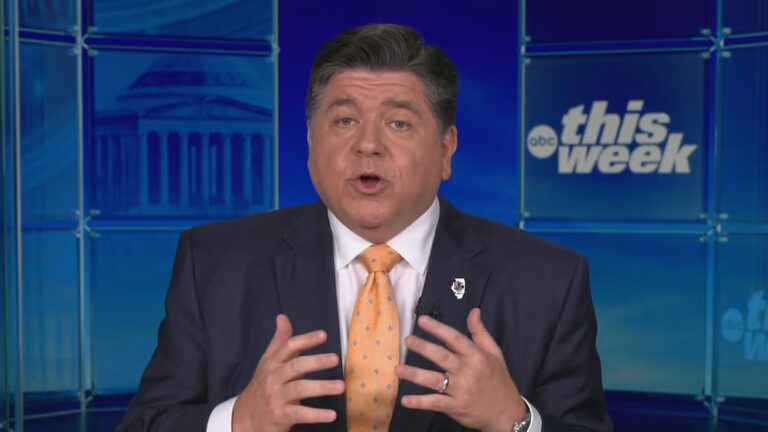
President Trump decided, on Monday morning, to advance a conspiracy theory about forged ballots in Florida on Twitter. Now political scientists who study authoritarian states and elections are sounding the alarm, warning that this kind of rhetoric imperils the health of American democracy.
Trump’s tweet alleges that someone, presumably Democrats, is cheating during the recounts currently underway in Florida. This is not true, but the recounts do threaten to reverse the very narrow leads currently held by the Republican candidates for governor (Ron DeSantis) and Senate (Rick Scott). This seems to have made the president upset enough to allege fraud.
“The Florida Election should be called in favor of Rick Scott and Ron DeSantis in that large numbers of new ballots showed up out of nowhere, and many ballots are missing or forged,” he tweeted. “An honest vote count is no longer possible-ballots massively infected. Must go with Election Night!”
Again, this is not true. There is no evidence to support Trump’s claim, which Scott has also advanced in a bid to stop the recount. Trump’s tweet is a false attack on the legitimacy of the 2018 election in the service of partisan ends.
But the problem is that in our hyper-polarized political climate, it’s likely that many Republicans will believe that the elections were rigged anyway, just as Trump’s repeated attacks on special counsel Robert Mueller’s Russia probe has convinced Republicans that the investigation is a witch hunt.
And the stakes here are as high as they are with Mueller, if not higher. Democracies have peaceful transfers of power because everyone agrees to abide by the results of elections — that their country’s elections are “legitimate,” in political science language. If people start to believe that their opponents are literally inventing votes to steal elections, then the elections won’t seem legitimate anymore.
Which is why political scientists are so worried about Trump’s tweet. They’ve seen this playbook before, in weak democracies and from would-be authoritarians who want to delegitimize their opponents.
“This development is still almost incalculably bad for American democracy,” writes Tom Pepinsky, a professor at Cornell University who studies authoritarianism. “This is one of the most worrisome developments in U.S. politics in the past several years,” adds Jessica Weeks, a political scientist at the University of Wisconsin Madison.
The consequences of millions of Republicans coming to believe that the Florida election results were faked are hard to predict. If the recounts end up producing Republican victories, they might even be minimal.
But if Democrats win one or both of the Florida races, and Trump continues to call it rigged, the consequences for faith in the electoral system could be severe. You could see increased Republican support for Trump ignoring legal constraints, for example, or further GOP attempts to interfere with state electoral systems.
“I suspect that one consequence will be an ever-greater tolerance for executive malfeasance, on the logic that Congressional representatives and state governments lack democratic legitimacy,” Pepinsky writes.
That’s to say nothing of the 2020 election, which Trump could plausibly lose. If he’s willing to attack the legitimacy of elections when he’s not on the ballot, imagine what happens if he loses personally — and if the stakes aren’t a Senate seat or the governor’s mansion, but the presidency. A loss of faith in a presidential election result by one party is an existential crisis in any democracy.
Now, America has gotten through a legitimacy-threatening electoral event in Florida before: the 2000 recount, which many Democrats still believe the Supreme Court stole from Al Gore. But in that case, both Gore and George W. Bush emphasized the importance of respecting the results (at least publicly), working to repair the reputational damage to the system and protect its legitimacy. Trump, it seems, would not.
“This is why Trump mustn’t stand for re-election. If he loses a close race, he’ll promote false claims of election fraud, and he’ll still be commander in chief for ten weeks,” tweeted Seth Masket, a scholar at the University of Denver. “No party that values the peaceful transfer of power would dare nominate him.”
There is, of course, little doubt that Trump will be the Republican nominee in 2020.
Sourse: vox.com






